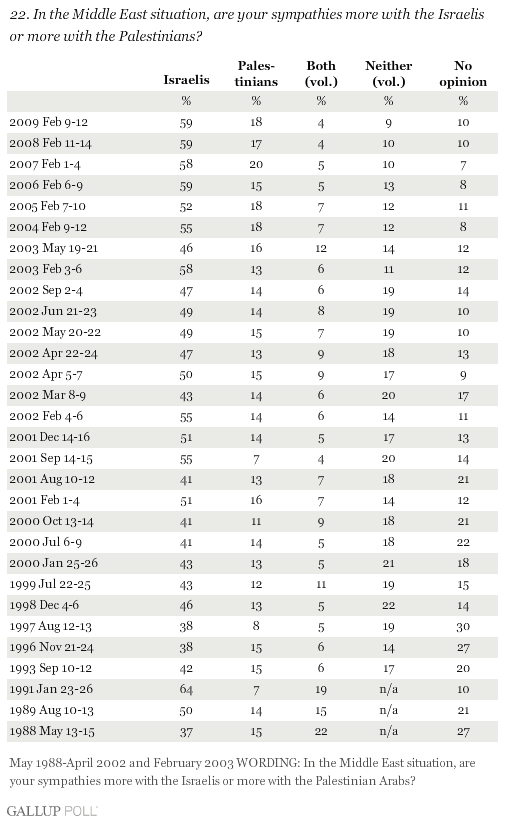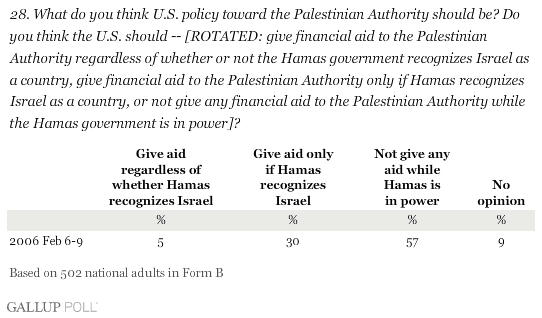PRINCETON, NJ -- The Obama administration has signaled it will be more energetic than its predecessor in brokering a Mideast peace, with the appointment of a special envoy and with Secretary of State Hillary Clinton's visit to the region this week. While their government may be steering a new course, Americans' views toward the Israeli-Palestinian conflict haven't changed: nearly 6 in 10 (59%) say their sympathies in the conflict lie more with the Israelis; just 18% side with the Palestinians.
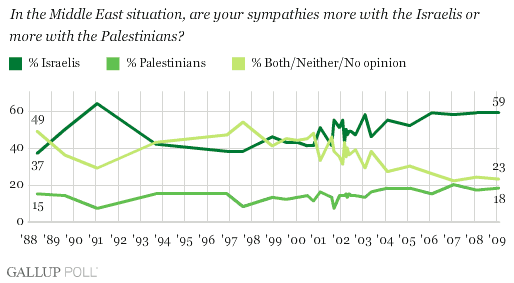
According to Gallup's annual World Affairs survey, updated Feb. 9-12, 2009, about a quarter of Americans are partial to neither the Israelis nor the Palestinians. This includes 9% saying they favor neither side, 4% saying they favor both equally, and 10% with no opinion. The 59% favoring Israel this year is identical to what Gallup found in February 2008, and similar to the annual reading each year since 2006.
Additionally, the new poll finds 63% of Americans holding a favorable view of Israel, including 21% holding a very favorable view of that country. Only 29% have an unfavorable view of Israel, including just 8% "very unfavorable."
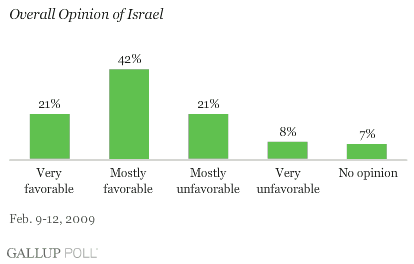
Favorability toward Israel was slightly higher a year ago at this time, when 71% viewed it favorably. Israel's military incursion into Gaza in December and January that killed more than 1,000 civilians and resulted in a major humanitarian crisis may have dampened American favorability toward that country slightly. However, today's rating of Israel is identical to the average favorability score for Israel since January 2000.
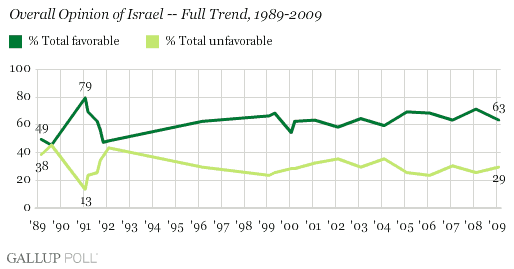
By contrast, the Palestinian Authority is seen in a mostly negative light, with only 15% viewing it positively and 73% negatively. And, among those holding strong views, the balance of opinion is even more negative: just 1% have a very favorable view vs. 30% very unfavorable.
Favorability toward the Palestinian Authority has varied some since 2000, ranging from 11% to 27%, but has registered close to 15% for each of the past three years.
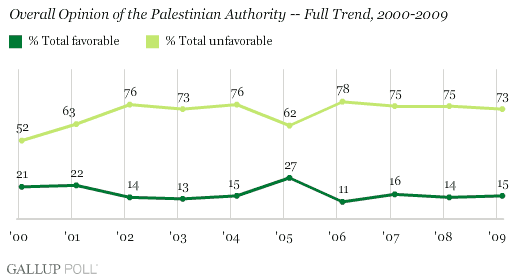
Aid for Gaza
The issue at hand this week in the Middle East is international funding for humanitarian and economic aid to the war-torn Gaza Strip.
Attending a Gaza aid conference in Egypt on Monday, Secretary of State Hillary Clinton said the United States will provide $900 million in aid to the Palestinians, but specified that only $300 million would be directed toward Gaza and that all of it would be channeled through the U.S.-backed Palestinian Authority led by President Abbas in the West Bank, not the Hamas-led government in Gaza.
This isolation of Hamas in U.S. aid to the Palestinians would seem to be consistent with the American public's general opposition to providing the Hamas government with any financial assistance, even if it were to formally recognize Israel. According to a Gallup Poll conducted shortly after the Hamas party won the January 2006 Palestinian elections, only 35% favored providing aid to the Palestinian Authority under Hamas leadership under any conditions (5% unconditionally and 30% if Hamas were to recognize Israel), while 57% said the United States should not provide that government with any aid.
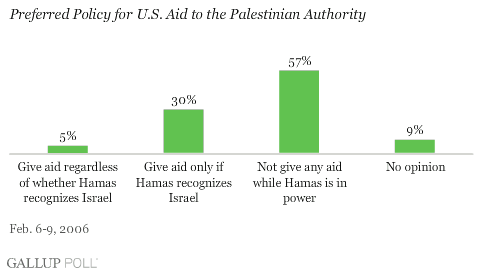
Two of the more prominent participants in the Gaza aid conference are Egypt, the host country, and Saudi Arabia, which has pledged $1 billion of the $5 billion raised. Egypt is nearly as highly ranked as Israel, according to the two countries' overall favorable ratings among Americans (59% for Egypt vs. 63% for Israel), although far fewer have a "very favorable" view of Egypt than of Israel (8% vs. 21%, respectively).
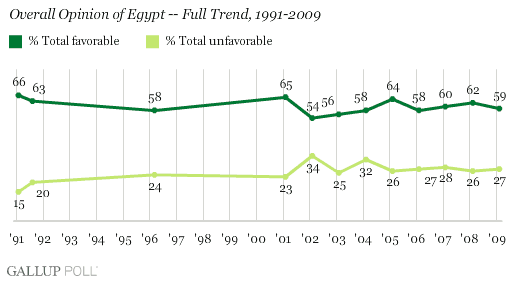
Americans view Saudi Arabia far less well, with only 31% favorable and 60% unfavorable. Opinion of Saudi Arabia fell sharply between February 2001 and February 2002 -- spanning the terrorist attacks on Sept. 11, 2001, which involved several Saudi-born hijackers -- and has yet to recover.
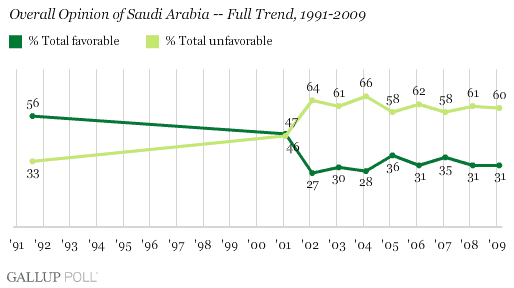
Bottom Line
President Barack Obama's desire to achieve a two-state solution to the Israeli-Palestinian conflict on his watch -- something Clinton reiterated this week -- may put him at odds with the newly elected leadership of Israel, but not necessarily with the American public. In 2002, Gallup found 48% of Americans in favor of an independent Palestinian state on the West Bank and Gaza Strip, and only 27% opposed. Support rose to 74% under the provision that the Palestinian government demonstrated it could stop suicide bombings in Israel.
At the same time, Clinton's recent assurance that U.S. support for Israel is "unshakable, durable, [and] fundamental" is consistent with Israel's broadly positive image in the United States, as well as with Israel's solid advantage over the Palestinians in American "sympathies."
Survey Methods
Results are based on telephone interviews with 1,022 national adults, aged 18 and older, conducted Feb. 9-12, 2009. For results based on the total sample of national adults, one can say with 95% confidence that the maximum margin of sampling error is ±3 percentage points.
Interviews are conducted with respondents on land-line telephones (for respondents with a land-line telephone) and cellular phones (for respondents who are cell-phone only).
In addition to sampling error, question wording and practical difficulties in conducting surveys can introduce error or bias into the findings of public opinion polls.
